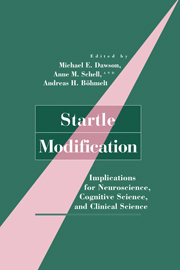Book contents
- Frontmatter
- Contents
- Contributors
- Preface
- Prologue: A Historical Note on the “Discovery” of Startle Modification
- 1 Startle Modification: Introduction and Overview
- PART I BASIC PARADIGMS, METHODS, AND PHENOMENA
- PART II PHYSIOLOGICAL MEDIATION OF STARTLE MODIFICATION
- PART III PSYCHOLOGICAL MEDIATION OF STARTLE MODIFICATION
- PART IV INDIVIDUAL DIFFERENCES AND STARTLE MODIFICATION
- 9 Affective Individual Differences, Psychopathology, and Startle Reflex Modification
- 10 Psychopathic Traits and Intoxicated States: Affective Concomitants and Conceptual Links
- 11 Schizophrenia Spectrum Disorders
- 12 Startle Modification in Children and Developmental Effects
- PART V RELATIONSHIPS WITH OTHER PARADIGMS AND MEASURES
- References
- Author Index
- Subject Index
11 - Schizophrenia Spectrum Disorders
Published online by Cambridge University Press: 26 March 2010
- Frontmatter
- Contents
- Contributors
- Preface
- Prologue: A Historical Note on the “Discovery” of Startle Modification
- 1 Startle Modification: Introduction and Overview
- PART I BASIC PARADIGMS, METHODS, AND PHENOMENA
- PART II PHYSIOLOGICAL MEDIATION OF STARTLE MODIFICATION
- PART III PSYCHOLOGICAL MEDIATION OF STARTLE MODIFICATION
- PART IV INDIVIDUAL DIFFERENCES AND STARTLE MODIFICATION
- 9 Affective Individual Differences, Psychopathology, and Startle Reflex Modification
- 10 Psychopathic Traits and Intoxicated States: Affective Concomitants and Conceptual Links
- 11 Schizophrenia Spectrum Disorders
- 12 Startle Modification in Children and Developmental Effects
- PART V RELATIONSHIPS WITH OTHER PARADIGMS AND MEASURES
- References
- Author Index
- Subject Index
Summary
ABSTRACT
Disorders of the inhibitory control of attention have long been noted in schizophrenia spectrum patients. Operational, behavioral techniques were first applied to the construct of impaired sensory filtering in schizophrenia in the 1970s. Braff et al. (1978) noted Frances Graham's (1975) observation of short lead interval inhibition in normal subjects, and hypothesized, then demonstrated, that schizophrenia patients have diminished short lead interval inhibition reflecting impaired gating. Although originally thought to reflect an automatic, preattentive sensorimotor gating function, Dawson et al. (1993) demonstrated that short lead interval inhibition is modulated by attention and may represent a state-independent vulnerability marker for schizophrenia. The findings of impaired short lead interval inhibition in schizotypal subjects (Cadenhead et al., 1993), in conjunction with confirmation of a theoretical link between impaired short lead interval inhibition and thought disorder in schizophrenia patients (Perry & Braff, 1994), added further support to the notion that impaired short lead interval inhibition reflects a trait-linked deficit in sensorimotor gating in schizophrenia spectrum individuals. The neural basis of sensorimotor gating deficits in rats is now better understood, allowing the study of proposed brain abnormalities in schizophrenia patients in animal models. Future directions in application of short lead interval inhibition techniques to schizophrenia spectrum research will continue to include parallel animal model research in conjunction with studies of medication effects, gross and specific psychopathology, gender, laterality, family studies, and attentional manipulation in schizophrenia spectrum populations.
Overview of Attention, Information Processing, and Inhibition in Schizophrenia
Descriptions of impaired attention as a central feature of the pathology in schizophrenia spectrum disordered patients have been noted for most of the past century.
- Type
- Chapter
- Information
- Startle ModificationImplications for Neuroscience, Cognitive Science, and Clinical Science, pp. 231 - 244Publisher: Cambridge University PressPrint publication year: 1999
- 6
- Cited by



